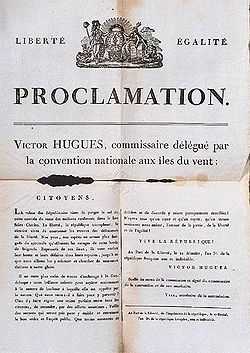Victor Hugues
Victor Hugues (born in Marseille July 20, 1762[1] and died in Cayenne August 12, 1826[2]) was a French politician and colonial administrator during the French Revolution, who governed Guadeloupe from 1794 to 1798, emancipating the island's slaves under orders from the National Convention.
Early life and appointment
Jean Baptiste Victor Hugues was born to a rich family of Marseille's bourgeoisie, son of Jean-François Hugues 1725-1789, a salesman, and Catherine Fodrin 1729-1822, issued from a family of silk traders of Saint-Étienne.
The family settled as colonists in Saint-Domingue at the beginning of the 1780s, but Victor was forced to return to France because of the Haitian Revolution. He then appointed Procureur of the Comité de salut public in La Rochelle with the support of the local Jacobin Club. He was subsequently appointed governor of Guadeloupe, where he was ordered to apply the emancipation decrees which declared the end of slavery in all French territories in February 1794.
Conflicts with Great Britain and the United States
Following the signing of the Whitehall Accord by (representing Guadeloupe), a British task force successfully invaded the island in April 1794. The planters and other Royalists had signed the Whitehall Accord with the British and colluded with France's rival as a way of rejecting revolutionary events, particularly the abolition of slavery. When Hugues disembarked on 21 May 1794, he had a small force of 1,150 soldiers. He immediately declared an end to slavery and so rallied the slaves and gens de couleur. Within five days he took the capital, Pointe-à-Pitre. Hugues was able to retake the island by 6 October 1794, when he obliged the English general to surrender in his camp of Barville with his whole force, in which were comprised 800 French emigres and 900 soldiers of African descent.

He ruled for four years before being recalled to France and was replaced by General Edme Desfourneaux. During that time, he purged the island of counter-revolutionaries, using a guillotine brought from France, and also worked to create a viable post-slavery regime, in which the island's farms and plantations still functioned.
Hugues is perhaps best known for authorizing privateers to attack shipping through the Caribbean, which brought great wealth to the island but also was part of the tensions between France and the United States (known as the Quasi-War in American history).
With an army composed of White, Mulatto and ex-slave soldiers, Hugues worked to export the revolution to neighboring islands, including Dominica, Saint-Martin, la Grenade, Saint-Vincent and Saint Lucia.
Guiana
In 1799, Hugues was envoyed to French Guiana by the French Consulate, where he was responsible for legislating unfree labour, and then slavery itself. He remained an administrator under the early years First Empire, but was forced out by a provincial maneuver of the Napoleonic Wars, when Portugal invaded the colony.
Upon his return, he was prosecuted for treason and conspiracy with the enemy. Acquitted in 1814, he returned to Guiana in 1817, served as governor and then stayed on as a private citizen.